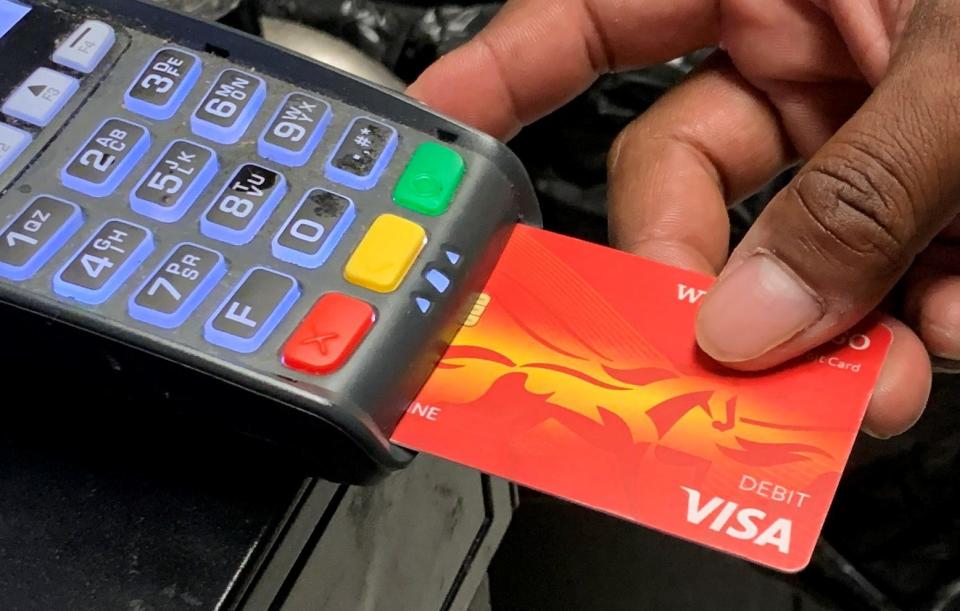Credit card swipe fees add to consumers' costs, but here's a fix Congress can make
When the impact of credit card “swipe” fees on prices consumers pay for groceries came up at a hearing in Washington in 2022, U.S. Sen. Marsha Blackburn was concerned.
“Tell me how this contributes to this out-of-control inflation that we have,” Blackburn asked Laura Karet, chair and CEO of Giant Eagle Inc..
“That means the price on the shelf for a package of a package of Oreos is going to cost more this summer," said the senator, adding that parents see the effect “when they’re packing lunches for kids to go to camp and making a peanut butter and jelly sandwich and putting a couple of cookies in there.”
A year later, swipe fees are still driving up prices parents pay to pack a lunch for their children – and by a lot more. At an average 2% to 4% of the purchase price, swipe fees account for up to 60 cents of the $15 or so it costs to buy a package of Oreos, a jar of peanut butter, one of jelly, and a loaf of bread. And depending on the credit card and the size of the shopping trip, swipe fees can equal the price of a gallon of milk or a dozen eggs in a typical cart of groceries.
That might not sound like much, but these fees, which giant credit card networks and big banks charge merchants to process transactions, add up quickly. And they affect almost everything consumers buy, not just groceries. That’s because they are most merchants’ highest operating cost after labor and are too much for small businesses to absorb. In 2021, they drove up prices for the average family by about $900 a year and in 2022 the amount increased to over $1,000 a year, according to the Merchants Payments Coalition. That’s a huge amount for working families in Tennessee still struggling under the stress of inflation and the uncertainties of today’s economy.
Guest opinion by Sen. Marsha Blackburn: Not one dime from U.S. taxpayers should go to antisemitic universities
Credit Card Competition Act would fix a broken payments market
Swipe fees are ultimately paid by consumers, totaling $1.8 billion in Tennessee last year. Nationwide, they have more than doubled in the past decade, soaring 50% since the pandemic and skyrocketing $22 billion last year alone to a record $160.7 billion.

And even though consumer groups, small businesses and key members of Congress have asked them not to, Visa and Mastercard raised swipe fees another $500 million beginning in October. That will mean even higher prices for Tennessee shoppers.
Swipe fees are growing so fast because Visa and Mastercard, which control 80% of the market, use their power to block competition. Each centrally sets the swipe fees charged by all banks that issue their cards rather than letting banks compete to offer lower fees. And they restrict processing to their own networks even though others could do the job for less while offering consumers better security. As a result, the average swipe fee is up to a dozen times the amount in Europe.
After last year’s Senate “Oreo hearing,” however, lawmakers said enough is enough and introduced legislation to fix the broken payments market.
The Credit Card Competition Act would give merchants and consumers a break by requiring that the largest banks enable credit cards to be processed over at least two unaffiliated networks – Visa or Mastercard plus a competitor like NYCE, Star or Shazam. Banks would choose which networks to enable but merchants would choose which to use, leading to competition over fees, security and service expected to save them – and their customers – $15 billion a year.
More: Why Congress should pass the Credit Card Competition Act | Opinion
Keep money circulating in the Tennessee economy instead of Wall Street
The competitors are the same networks that already safely and efficiently process billions of dollars in consumers’ daily ATM and debit card transactions. In addition to having lower fees, the Federal Reserve says they have one-eighth the fraud of Visa and Mastercard.Merchants and consumers in Tennessee would save a projected $291 million a year with no changes in which cards consumers use or the credit card rewards they receive.That’s money that would be kept circulating in the Tennessee economy instead of locked away in Wall Street vaults. And it’s money supermarkets like mine would use to help hold down the price of Oreos and other foods. Grocery is the most competitive sector of the economy, so consumers can rest assured the savings will be passed along because if one store doesn’t, the next one will.Senator Blackburn is concerned about the costs parents face when feeding their children, and Sen. Bill Hagerty certainly feels the same. They can take a major step in helping grocers keep food prices affordable for Tennessee families by supporting the Credit Card Competition Act.

Joey Hays is owner of Dyer Foods Inc., which is based in Dyer, Tennessee, and operates 18 supermarkets in western Tennessee under the Food Rite, Hays Cash Saver and Save A Lot brands.
This article originally appeared on Nashville Tennessean: Credit card fees reform would create competition and reduce prices

